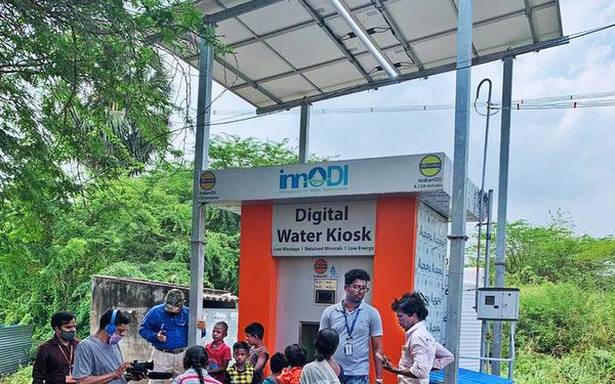An initiative of IIT-Madras and IOCL, it has helped villagers in two panchayats
Two village panchayats in Thoothukudi district now access clean drinking water thanks to an initiative of the Indian Institute of Technology–Madras and Indian Oil Corporation’s corporate social responsibility.
The villagers can access drinking water by swiping a card for a nominal payment. They have been trained to maintain the water plant.
At Veppalodai, where women trekked several miles in search of potable water, the initiative has resulted in around 5,000 families accessing drinking water.
Balasubramanian, husband of Velkani, the panchayat president, said groundwater in their village was not potable. “We have some waterbodies nearby, but the water is not good. For three months we have been getting good drinking water. We have installed borewell and water is pumped to the tank. The new plant filters water and we use it for drinking. As the water was not potable, many of us suffered from kidney stones,” he said.
The plant is run on solar power and villagers can draw 300 to 400 pots a day.
“They have been kind to give us one unit. But we would like at least two more units to serve the entire population. We cannot ask too much of people who are kind to us,” he said.
At Vedapatti a similiar plant has been installed. “The plant is ready but the elections were announced and it could not be commissioned,” said Karkuvel, panchayat secretary.
Around 500 families and a population of 2,000 depends on water from Vaippar river here.
“In our panchayat we depend on borewell water. The filtered water is tasty. They have said we can draw water by swiping a card. A pot will cost ₹4. It is a solar plant that will run even during power cuts. It will help the neighbouring villages of Viruthampatti, Mamunaiyar and Nedunkulam as well,” Mr. Karkuvel said.
Chief executive officer of International Centre for Clean Water E. Nandakumar said three drinking water kiosks had been installed in Thoothukudi district and Vagaikulam in Ramanathapuram district. The ICCW was an initiative of the IIT-Madras. The centre had installed the capacitive de-ionisation units with funds from the IOC and InnoDI Technologies.
Mr. Nandakumar said unlike the reverse osmosis technology which recovered only 50-60% of the water, CDI offerred a sustainable alternative by saving on reject water and retaining essential minerals such as calcium and magnesium. It also consumed less energy and low on operating and maintenance cost.
“We have taught the communities to take ownership and promote water stewardship,” Mr. Nandakumar said. The districts were chosen as the water was saline and brackish there. Studies found that over the past century, Thoothukudi received much lower rainfall than the State’s average of 925 mm.
Source: Read Full Article

